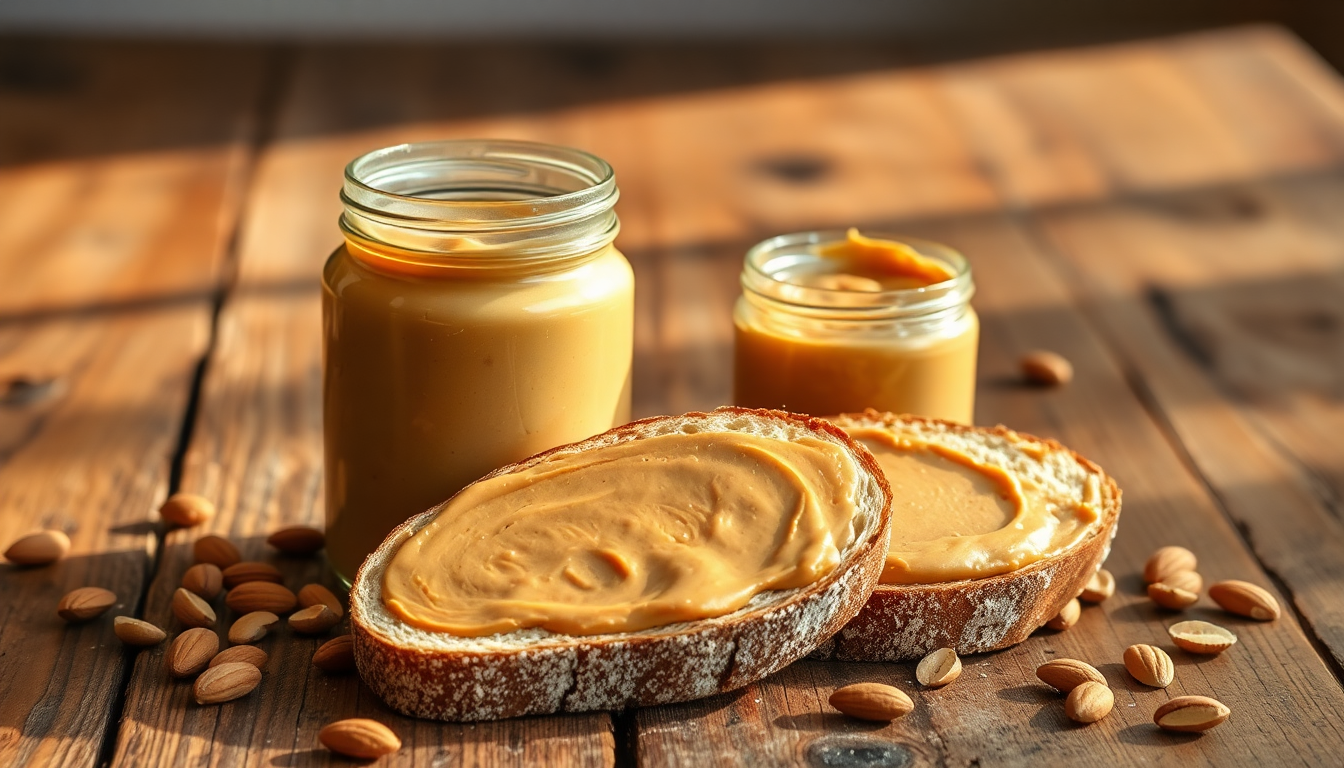
Is Almond Butter Better Than Peanut Butter?
The ultimate comparison of two beloved nut butters: nutrition, taste, versatility, and why your choice matters for your health and the planet.
In the world of creamy, spreadable proteins, two contenders have long dominated our pantry shelves and hearts: peanut butter, the familiar classic, and almond butter, the sophisticated newcomer. At Coracao Confections, we're passionate about nutrient-dense ingredients that taste amazing while supporting your wellbeing. So which spread deserves your spoon? Let's dive into this nutty debate and explore the differences between these popular nut butters.
Nutritional Face-Off: Almond Butter vs. Peanut Butter
Calorie and Macronutrient Comparison
Both almond and peanut butter provide similar caloric content, with approximately 190-200 calories per two-tablespoon serving. However, the nutritional profiles offer some notable differences worth considering:
Protein Content:
- Peanut Butter: 7-8g per serving
- Almond Butter: 6-7g per serving
Peanut butter takes a slight lead in the protein department, making it a popular choice for athletes and those looking to increase their protein intake without animal products.
Fat Profile:
- Peanut Butter: 16-18g total fat (with lower monounsaturated fat)
- Almond Butter: 18-20g total fat (with higher monounsaturated fat)
While almond butter contains slightly more fat overall, it offers a higher percentage of heart-healthy monounsaturated fats, which can help reduce bad cholesterol levels and lower the risk of heart disease.
Fiber Content:
- Peanut Butter: Approximately 1.6g per serving
- Almond Butter: Approximately 3.3g per serving
Almond butter provides significantly more fiber, which supports digestive health, helps maintain healthy blood sugar levels, and contributes to a feeling of fullness.
Vitamin and Mineral Comparison
This is where almond butter truly shines. Compared to peanut butter, almond butter offers:
- 3x more vitamin E: A powerful antioxidant that protects cells from damage
- 7x more calcium: Essential for bone health and proper muscle function
- 2x more iron: Critical for oxygen transport and energy production
- Higher levels of magnesium: Supports over 300 biochemical reactions in the body
- More manganese and copper: Important for metabolic health and immunity
Peanut butter isn't nutritionally void, however. It provides more folate than almond butter, which is essential for cell division and DNA synthesis.

Taste and Culinary Versatility
Flavor Profiles
Peanut Butter offers a distinctive, robust flavor that many find nostalgically comforting. Its stronger taste profile means it often takes center stage in recipes.
Almond Butter provides a more subtle, delicate flavor that some describe as more sophisticated. Its milder taste allows it to blend more seamlessly into recipes without overpowering other ingredients.
Texture Differences
Both nut butters are available in smooth and chunky varieties, but there are inherent textural differences:
Peanut Butter tends to be denser and less runny, making it ideal for structured recipes like cookies where you need a firmer consistency.
Almond Butter has a naturally runnier consistency and slightly grainier texture, which makes it excellent for drizzling over oatmeal or blending into smoothies.
Culinary Applications
Both nut butters are incredibly versatile in the kitchen. Here are some ways they shine:
Perfect Pairings for Peanut Butter:
- Thai-inspired sauces and dressings
- Classic PB&J sandwiches
- Traditional baked goods
- Savory dishes with soy sauce and ginger
Almond Butter Excellence:
- Smoothies and breakfast bowls
- Energy bars and balls
- Mediterranean and Middle Eastern-inspired dishes
- Raw desserts and healthier treats
At Coracao Confections, we've embraced the unique properties of almond butter in our Almond Butter Chocolate cups, creating a cleaner, more nutrient-dense twist on the classic peanut butter cup. The subtle nuttiness of almond butter pairs beautifully with our rich, organic chocolate for a sophisticated treat.
Health Considerations Beyond Nutrition
Allergies and Sensitivities
Peanut allergies are one of the most common food allergies, affecting approximately 1.4-2% of the U.S. population. They're also often more severe than tree nut allergies.
Almond allergies, while still serious, are less common, affecting about 0.5-1% of people. For those with peanut allergies but no tree nut allergies, almond butter can be a safe alternative (though always consult with your healthcare provider).
Digestibility
Some people find almond butter easier to digest than peanut butter. This could be due to:
- Higher enzyme content in almonds
- Different protein structures
- Almond butter's higher fiber content
Potential Contaminants
Peanuts grow underground and can be susceptible to aflatoxins, which are produced by certain molds. Quality brands test for these compounds, but it's something to be aware of.
Almonds grow on trees, which generally reduces their exposure to soil molds and potential contaminants.
Environmental and Ethical Considerations
Water Usage
Almond trees require significant water to grow, particularly in drought-prone regions like California. This has raised environmental concerns about almond cultivation.
Peanuts generally require less water to grow and can be cultivated in various climates, potentially making them more environmentally sustainable in some regions.
Sustainability Practices
The environmental impact of both nut butters depends greatly on farming practices. Look for brands that prioritize:
- Organic growing methods
- Fair trade certification
- Regenerative agriculture practices
- Minimal processing
At Coracao Confections, we source our almonds from organic farms committed to sustainable practices, supporting both environmental health and worker welfare.
Making Your Choice: Which Butter is Better?
The answer to whether almond butter is better than peanut butter isn't straightforward—it depends on your individual needs, preferences, and values.
Choose Almond Butter If:
- You're looking for more heart-healthy fats and fiber
- Higher vitamin and mineral content is important to you
- You prefer a milder, more subtle flavor
- You have a peanut allergy
- You're focused on getting more antioxidants in your diet
Choose Peanut Butter If:
- You're prioritizing higher protein content
- Budget is a consideration (peanut butter is typically less expensive)
- You crave that classic, nostalgic flavor
- Water conservation is an important environmental factor for you
- You're looking for more folate in your diet
Quality Matters: What to Look for in Any Nut Butter
Regardless of which nut butter you choose, quality makes a tremendous difference in both nutritional value and taste. Here's what to look for:
Ingredient List
The ideal nut butter contains just one or two ingredients:
- Nuts (peanuts or almonds)
- Perhaps a small amount of salt
Avoid products with:
- Added oils, especially palm oil (environmental concerns)
- Added sugars
- Emulsifiers and stabilizers
- Artificial flavors or preservatives
Processing Methods
Look for nut butters that are:
- Cold-pressed or stone-ground to preserve nutrients
- Made from raw or gently roasted nuts
- Processed at low temperatures to maintain nutritional integrity
Organic Certification
Choosing organic nut butters helps you avoid:
- Pesticide residues
- GMO ingredients
- Certain processing chemicals
At Coracao Confections, we take these quality considerations seriously. Our Chocolate Almond Butter combines stone-ground organic almond butter with fair-trade cacao for a nutrient-dense treat free from artificial additives.
Creative Ways to Enjoy Nut Butters
Whether you choose almond or peanut butter (or enjoy both!), here are some delicious ways to incorporate them into your diet:
Breakfast Ideas
- Swirl into oatmeal or yogurt
- Spread on whole-grain toast with sliced fruit
- Blend into smoothies for added creaminess and protein
- Use as a topping for acai bowls
Snack Inspirations
- Dip apple or pear slices
- Spread on celery with a sprinkle of cacao nibs
- Mix with a touch of coconut oil and drizzle over popcorn
- Blend with dates and roll into energy balls
Dessert Creations
- Stir into melted dark chocolate for homemade nut butter cups
- Use as a filling for dates with a chocolate coating
- Blend with frozen bananas for a quick "nice cream"
- Incorporate into no-bake cookie recipes
Savory Applications
- Whisk into salad dressings
- Add to curries or stews for creaminess and depth
- Mix with soy sauce, ginger, and lime for a quick stir-fry sauce
- Use as a base for vegetable dips
The Coracao Approach to Nut Butters
At Coracao Confections, we've elevated the nut butter experience through our commitment to organic, fair-trade ingredients and artisanal production methods. Our almond butter products represent the perfect marriage of nutrition and indulgence:
-
Almond Butter Chocolate: A clean, sophisticated take on the classic nut butter cup, featuring creamy almond butter with a touch of coconut sugar and Himalayan crystal salt, covered in pure heirloom cacao.
-
Chocolate Almond Butter: Our spreadable delight combines stone-ground almond butter with our signature organic chocolate for a treat that's both nourishing and satisfying.
We prioritize quality at every step, using only organic almonds and ensuring our products remain free from artificial additives, soy, gluten, and dairy.
Conclusion: Embracing Nut Butter Diversity
In the debate of almond butter versus peanut butter, there's no definitive winner—both offer unique nutritional benefits and culinary possibilities. Rather than choosing one exclusively, many health-conscious consumers enjoy both, leveraging their different properties for various uses.
Almond butter may edge out peanut butter in terms of certain nutrients and healthy fats, while peanut butter offers more protein at a lower cost. The "best" choice ultimately depends on your individual health goals, taste preferences, and values.
Whatever your preference, choosing high-quality, organic options with minimal ingredients will ensure you get the most nutritional benefit from your nut butter of choice. And don't forget to explore the creative culinary possibilities that both these wonderful spreads have to offer!

Claire Bennett
I'm Claire, a chocolate lover and artisan based in a small town where I run a tiny home kitchen dedicated to exploring everything chocolate. From single-origin dark bars to creamy ganache and handmade truffles, I find joy in working with all types of chocolate. I believe chocolate has a story, and I love bringing that story to life through humble, heartfelt creations.



Leave a comment
This site is protected by hCaptcha and the hCaptcha Privacy Policy and Terms of Service apply.